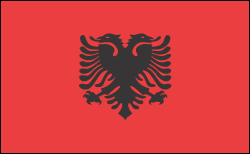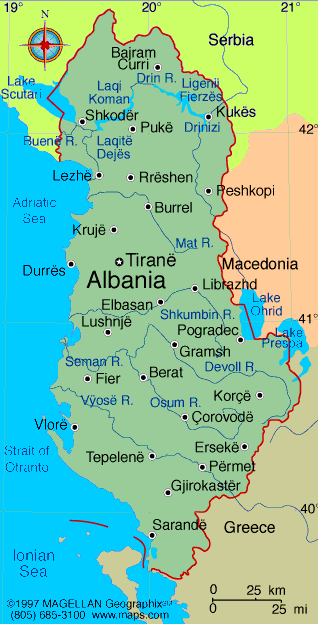ALBANIA

Geography: Albania is situated on the eastern shore of the Adriatic Sea, with Montenegro and Serbia to the north, Macedonia to the east, and Greece to the south. Slightly larger than Maryland, Albania is composed of two major regions: a mountainous highland region (north, east, and south) constituting 70% of the land area, and a western coastal lowland region that contains nearly all of the country's agricultural land and is the most densely populated part of Albania.
Government: Emerging democracy.
History: A part of Illyria in ancient times and later of the Roman Empire, Albania was ruled by the Byzantine Empire from 535 to 1204. An alliance (1444–1466) of Albanian chiefs failed to halt the advance of the Ottoman Turks, and the country remained under at least nominal Turkish rule for more than four centuries, until it proclaimed its independence on Nov. 28, 1912.
Largely agricultural, Albania is one of the poorest countries in Europe. A battlefield in World War I, after the war it became a republic in which a conservative Muslim landlord, Ahmed Zogu, proclaimed himself president in 1925 and king (Zog I) in 1928. He ruled until Italy annexed Albania in 1939. Communist guerrillas under Enver Hoxha seized power in 1944, near the end of World War II. Hoxha was a devotee of Stalin, emulating the Soviet leader's repressive tactics, imprisoning or executing landowners and others who did not conform to the socialist ideal. Hoxha eventually broke with Soviet communism in 1961 because of differences with Khrushchev and then aligned himself with Chinese communism, which he also abandoned in 1978 after the death of Mao. From then on Albania went its own way to forge its individual version of the socialist state and became one of the most isolated—and economically underdeveloped—countries in the world. Hoxha was succeeded by Ramiz Alia in 1982.
History: A part of Illyria in ancient times and later of the Roman Empire, Albania was ruled by the Byzantine Empire from 535 to 1204. An alliance (1444–1466) of Albanian chiefs failed to halt the advance of the Ottoman Turks, and the country remained under at least nominal Turkish rule for more than four centuries, until it proclaimed its independence on Nov. 28, 1912.
Largely agricultural, Albania is one of the poorest countries in Europe. A battlefield in World War I, after the war it became a republic in which a conservative Muslim landlord, Ahmed Zogu, proclaimed himself president in 1925 and king (Zog I) in 1928. He ruled until Italy annexed Albania in 1939. Communist guerrillas under Enver Hoxha seized power in 1944, near the end of World War II. Hoxha was a devotee of Stalin, emulating the Soviet leader's repressive tactics, imprisoning or executing landowners and others who did not conform to the socialist ideal. Hoxha eventually broke with Soviet communism in 1961 because of differences with Khrushchev and then aligned himself with Chinese communism, which he also abandoned in 1978 after the death of Mao. From then on Albania went its own way to forge its individual version of the socialist state and became one of the most isolated—and economically underdeveloped—countries in the world. Hoxha was succeeded by Ramiz Alia in 1982.

Map of Albania
President:
Bujar Nishani (2011)
Prime
Minister: Edi Rama (2013)
Land area:
10,579 sq mi (27,400 sq km); total area: 11,100 sq mi (28,748
sq km)
Population (2014 est.):
3,020,209 (growth rate: 0.3%); birth rate: 12.73/1000; infant mortality
rate: 13.19/1000; life expectancy: 77.96; density per sq mi: 272
Capital and largest city (2011 est.):
Tirana, 419,000
Other large cities: Durres, 113,900;
Elbasan, 97,000
Monetary unit:
Lek
National name: Republika e
Shqiperise
Languages:
Albanian 98.8% (official - derived from Tosk dialect),
Greek 0.5%, other 0.6% (including Macedonian, Roma, Vlach, Turkish,
Italian, and Serbo-Croatian), unspecified 0.1% (2011 est.)
Ethnicity/race:
Albanian 82.6%, Greek 0.9%, other 1% (including Vlach,
Roma (Gypsy), Macedonian, Montenegrin, and Egyptian), unspecified 15.5%
(2011 est.)
Religions:
Muslim 56.7%, Roman Catholic 10%, Orthodox 6.8%, atheist
2.5%, Bektashi (a Sufi order) 2.1%, other 5.7%, unspecified 16.2% (2011
est.)
National Holiday:
Independence Day, November 28
Literacy rate: 98.7% (2011 est.)
Economic summary:
GDP/PPP (2013 est.): $12.8 billion; per capita $10,700.
Real
growth rate: .7% (2013 est.). Inflation: 1.7% (2013 est.).
Unemployment: 16.9% official rate (2013 est.).
Note: These are official rates that may not include those working at
near-subsistence farming.
Arable land: 21.63% (2011).
Agriculture: wheat, corn, potatoes, vegetables, fruits, sugar beets, grapes; meat, dairy products.
Labor force: 1,098,000; agriculture 54.%, industry 12.8%, services 32.6% (2012 est.).
Industries: food processing, textiles and clothing; lumber,
oil, cement, chemicals, mining, basic metals, hydropower.
Natural resources: petroleum, natural gas, coal, bauxite, chromite,
copper, iron ore, nickel, salt, timber, hydropower.
Exports:
$2.323 billion (2013 est.): textiles and footwear; asphalt,
metals and metallic ores, crude oil; vegetables, fruits, tobacco.
Imports: $2.1 billion (2012 est.): machinery and
equipment, foodstuffs, textiles, chemicals.
Major trading
partners: Italy, Spain, Greece, Turkey, Germany, China.
Communications: Telephones: main lines
in use: 312,000 (2012); mobile cellular: 3.5 million (2012). Radio
broadcast stations: 2 public, 25 private (2012). Television broadcast stations: 3 public, 60+
private (2010). Internet hosts: 15,528 (2012). Internet users: 1,300,000 (2011).
Transportation: Railways: total: 339 km
(2011). Highways: total: 18,000 km; paved: 7,020 km; unpaved:
10,980 km (2011). Waterways: 41 km (2011). Ports and
harbors: Durres, Sarande, Shengjin, Vlore. Airports: 4
(2013).
International disputes: The
Albanian Government calls for the protection of the rights of ethnic
Albanians in neighboring countries, and the peaceful resolution of
interethnic disputes; some ethnic Albanian groups in neighboring
countries advocate for a "greater Albania," but the idea has little
appeal among Albanian nationals; the mass emigration of unemployed
Albanians remains a problem for developed countries, chiefly Greece
and Italy.
-------------------- o --------------------
No comments:
Post a Comment